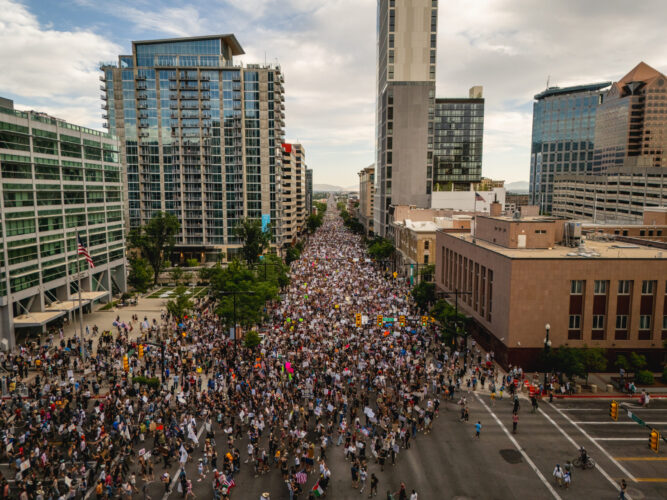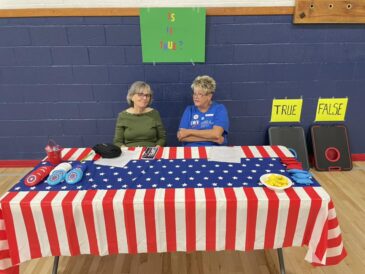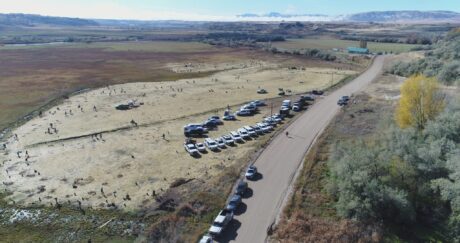Utah Gov. Cox says state warned ‘No Kings’ organizers it was a ‘bad idea’ to use ‘peacekeepers’
Governor says there were ‘a lot of good people who made mistakes’ of shooting that left one protester dead in Salt Lake City

Photo by Spenser Heaps for Utah News Dispatch
People take part in the “No Kings” protest in Salt Lake City on Saturday, June 14, 2025.Months before the Salt Lake City “No Kings” protest on June 14 where police say an armed “peacekeeper” accidentally shot and killed a man, the Utah Department of Public Safety had warned protest organizers that having peacekeepers was a “bad idea.”
That’s what Utah Gov. Spencer Cox told reporters during his monthly PBS Utah news conference on Thursday, after he was asked if there’s anything the state can or should do to prevent similar tragedies.
“I don’t know that there’s more that we can do,” Cox said, adding state officials “work very closely with organizations across the state,” including the ‘No Kings’ protesters.
“That was an absolute tragedy,” he said. “I can tell you that they were warned months and months and months ago that it was a bad idea to have these peacekeepers to be a part of what they were attempting to do, that it could lead to something like this, and sadly, it did.”
Asked to give more details about those warnings, Cox said “the leaders of the event were warned many months ago when they first started doing this, and they were warned by our Department of Public Safety.”
“Our DPS said, ‘It’s a bad idea. You can do it, it’s not illegal, there’s nothing illegal about it, it’s just a bad idea,'” Cox said. “‘They said, ‘Well, we think it’s a good idea.’ End of conversation.”
The Utah Department of Public Safety did not immediately return a request for more information about the communications with the “No Kings” organizers.
According to Salt Lake City police, the shooting during the protest happened after two men, who described themselves to police as “peacekeepers,” confronted 24-year-old Arturo Gamboa, who was openly carrying an AR-15 style rifle during the protest.
One of the men, reportedly part of the event organizer’s volunteer security team, told police he thought Gamboa was acting suspiciously, which led him to fire three shots from a handgun, hitting Gamboa in the back but also inadvertently striking innocent bystander Arthur “Afa” Ah Loo, who was later pronounced dead at a hospital.
In the wake of that shooting, the national 50501 group that has organized “No Kings” protests across the country disowned the Utah chapter that organized the Salt Lake City protest, citing a strict “no-weapons policy” and saying SLC 50501 had disregarded “our nonnegotiable values.”
The “peacekeeper” who was involved in the shooting was a military veteran, the protest organizers said last month.
Pressed on who he believed was responsible for Ah Loo’s death, Cox said, “That’s a good question, and the (Salt Lake County) district attorney will eventually make that decision as it goes forward.”
Cox added there were “a lot of good people who made mistakes.”
“I don’t know who’s ultimately responsible, but I think a lot of people are responsible for what happened,” the governor said. “It’s a terrible tragedy. My heart goes out to his family. I think, again, mistakes were made by the organizers, by the peacekeepers, by the protester who brought his rifle. Lots of mistakes were made.”
Unlike 26 other states, Utah has not adopted a law prohibiting the open carrying of long guns at state capitols or political protests, according to Everytown Research & Policy, an organization that produces research on gun violence and advocates for gun violence prevention. The group has ranked Utah as No. 36 in the country for “gun law strength.”
When asked about other states’ adoption of laws of those kinds and whether Utah should consider something similar, Cox balked.
“I’m a big believer in the Second Amendment. I don’t think it’s something that we should consider,” he said. “But again, I hope people will just be smart and responsible.”
It’s up to Salt Lake County District Attorney Sim Gill to decide whether anyone involved in the shooting will be charged with a crime. The Salt Lake City Police earlier this month turned over their investigation to prosecutors.
Brent Weisberg, a spokesperson for the Salt Lake City Police Department, said in a statement issued Wednesday that “in this particular case, the SLCPD did not offer a charging recommendation but instead presented our initial investigative findings to the Salt Lake County District Attorney’s Office for review and determination.”
“While there are certain instances where we may provide input, charging decisions are ultimately made by the prosecuting attorney,” Weisberg said.



